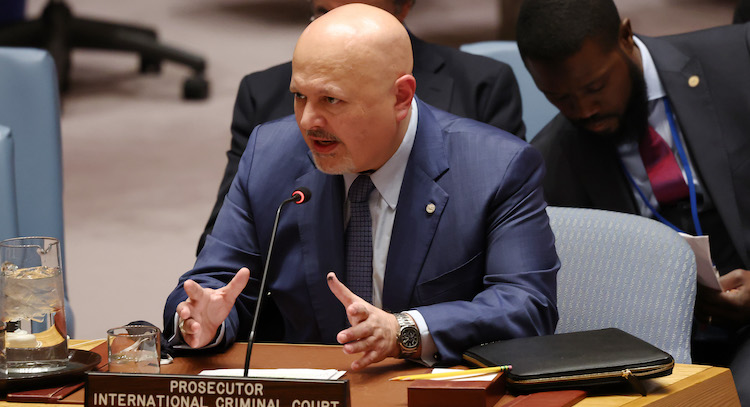The Rule of Scapegoats: Someone’s reason for needing a scapegoat is just as newsworthy as his desperate actions to bring someone else down.
And that appears to be the case yet again, this time with Karim Khan.
Khan is the lead prosecutor for the International Criminal Court, a supra-national NGO on steroids that identifies as a judicial body. (An affliction we might call “bureaucratic dysmorphia.”) Under Khan’s leadership, the ICC dove headlong into uncharted waters by seeking to arrest a leader of a nation for alleged war crimes when the ICC had jurisdiction over neither the alleged perpetrator nor the alleged victim.
The ICC, in other words, went full vigilante. As is often the case with such vigilantism, the target was Israel.
Non-democracies wanted action against Israel and didn’t care if the action was legitimate, because (as ever) they needed to distract from their mistreatment of their own citizens by focusing on a common enemy. Some democracies backed the ICC, if tentatively, as a way of catering to the angry anti-Israel mobs in the streets but without jeopardizing their own security by materially intervening in a war against Israel.
But the question remained: Why did Khan bend to the pressure from these countries and announce an arrest warrant against Israeli Prime Minister Benjamin Netanyahu and then-Defense Minister Yoav Gallant when it would hurt Khan’s relationship with the U.S. and destroy the court’s remaining legitimacy as a neutral arbiter? Khan didn’t appear to be getting anything out of this reputation-destroying stunt. So why’d he do it? Why did Khan personally need a scapegoat?
Thanks to an explosive piece of reporting in the Wall Street Journal, we might finally have our answer: A female employee of Khan’s testified that she had been repeatedly sexually assaulted by Khan, bullied into temporarily covering it up, and nearly driven to suicide by Khan’s treatment of her.
The accuser had been working for the ICC for six years before joining Khan’s team in 2023. According to her testimony, Khan first sexually assaulted her in June of that year on a trip abroad. He would repeat the assault in New York, Colombia, Chad, Paris, and his wife’s home in The Hague.
Khan was scheduled to visit Israel and Gaza in an important step in the process of collecting evidence and interviewing officials before deciding whether to issue warrants. Then last spring, he was made aware of the rape allegations and canceled the fact-finding trips. Two weeks later he issued the arrest warrants.
The timing was no coincidence, the Journal reports: “The warrant shored up support for Khan among anti-Israel ICC nations that would likely back Khan if the allegations ever became public, according to court officials. The warrant also discouraged his accuser for a time from pushing her allegations, officials said, because she strongly supported the investigation of Israeli leaders.”
From this we learn three things. First, the investigation was always a sham, because as soon as Khan fact-gathering trip became inconvenient he canceled it and issued the warrants anyway. Second, the warrants against Israeli leaders would insulate him from criticism from many of the ICC member states, who didn’t care if there was evidence that he was raping a subordinate to the point of driving her to considering suicide. Third, according to testimony, Khan explicitly tied the rape allegations to the Israeli warrants.
“As the abuse allegations were swirling among ICC staff and others, Khan allegedly tried to get his accuser to disavow them by telling her the charges would hurt the Palestinian investigation, according to her testimony,” the Journal reports. “The casualties of the allegations would include ‘the justice of the victims that are on the cusp of progress,’ he said to her, according to a record of a call that is now part of an independent U.N. investigation into her allegations. ‘Think about the Palestinian arrest warrants,’ she said he told her on another occasion, according to the testimony.”
This testimony, if accurate, describes a monster. Not a jerk with poor impulse control; an actual monster. He also accused her indirectly of being part of a conspiracy to bring down the ICC, which is basically his way of saying she’s some kind of agent of the Jews.
The accuser also wrestled with whether to come forward. Her mother was sick and needed care, which her salary helped provide. She told a friend she wanted a job transfer rather than to hold Khan accountable: “I held on for as long as I could because I didn’t want to f— up the Palestinian arrest warrants,” she testified.
There is obviously no defense of the arrest warrants’ legitimacy now—if they are not canceled, the ICC should be subject to every applicable sanction. If Khan doesn’t resign, this is the end of the ICC experiment: A permanent such court was always going to be less effective than the situational courts that were set up to investigate war crimes in the past, and its permanence meant the court was full of revolting employment incentives. That part is now beyond dispute as well.
In addition to that, there is the matter of what anti-Semitism does to people. Khan’s alleged victim hesitated to come forward because she, too, backed the arrest warrants that were issued in order to protect her alleged rapist.
Civilization is going to have to decide if there is anything in the universe more important to it than its war on the Jews. I’m not looking forward to hearing the answer.


















